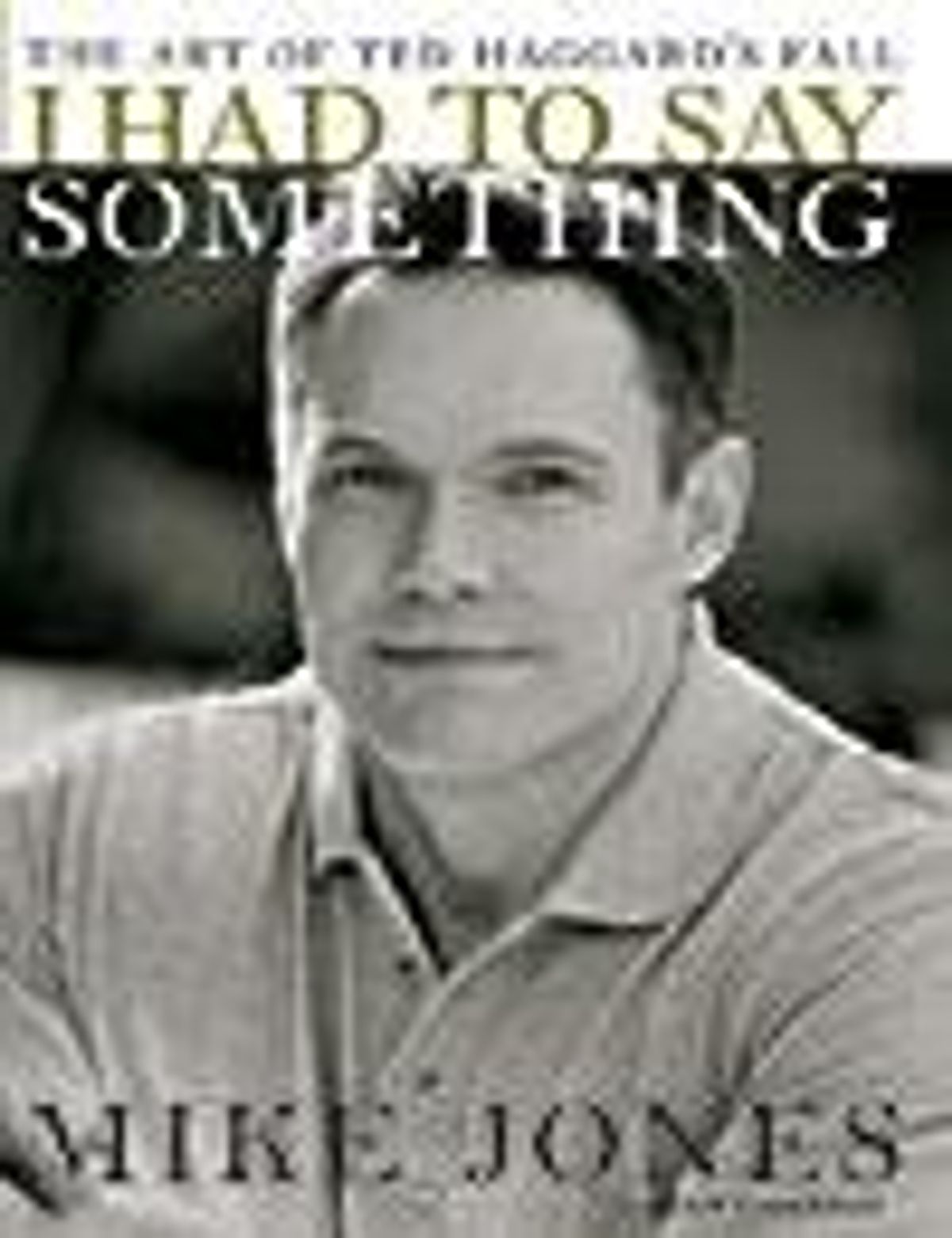As the sun rose
in the early-morning sky on November 1, 2006, Mike Jones
sat quietly in his apartment, staring at the telephone. He
was at the same time reluctant and eager, knowing that
his life was about to change. Picking up the receiver
before the second ring, he took a deep breath and was
patched through as the guest on a local drive-time FM radio
talk show. Jones, a gay escort from Denver, was about
to break the cardinal rule of his profession--he was
going public with the identity of a client.
The ink is still
drying on the pages of the latest offering from
Manhattan-based Seven Stories Press. In I Had to
Say Something: The Art of Ted Haggard's Fall, Jones
recounts, with the help of biographer Sam Gallegos,
how his decision to speak out just before the midterm
elections catapulted him into the public eye, changing
his life and, perhaps, the face of national politics.
Within days of
Jones's revelation, which dominated the national media
cycle, Haggard disappeared from public life. He resigned
from his role as the leader of the National
Association of Evangelicals, came under investigation
by his Colorado Springs-based megachurch, and checked
in to an Arizona facility for "restoration" to address
what he termed his "repulsive and dark"
desires.
Most people will
skim through this book to find the lurid details of
Haggard's secret sex life; a rapid flip-through of the more
titillating highlights must include pages 8, 113, and
174. Jones offers, however, much more. His narrative
is personal and reads like a friend confiding
cherished memories and deep personal introspection over an
afternoon cup of coffee. He covers career, family, and
hopes for the future. Jones is polite
and intuitive, and above all, observant. These skills
proved just as important in his work as physique,
technique, and sexual versatility did.
The reader comes
face-to-face with Haggard as he evolves over three
years: from an over-wide grin with nervous eyes darting
around the room, avoiding eye contact, faint features
in the dark as tears well up during intimate silence,
to a crazed, manic enthusiasm for thrill and release.
This book exposes Haggard's vulnerability, which found its
limited expression in the privacy of Jones's anonymous
sanctuary.
Jones certainly
delivers detail on the stereotypical prostitute's visit,
complete with dirty talk and cleanup washcloths. But it's
when he describes Haggard's demeanor, wide-eyed and
curious, that the tale engages. Over the course of
three years, Jones explains, the closeted leader of 30
million evangelicals progressed from shame-filled orgasm in
the near-dark to a voracious pursuit of kink and
mind-altering substance.
After a year of
monthly appointments, Haggard asked about crystal
methamphetamines. Jones takes pains in the book to explain
that he does not deal any type of drug. In a detailed
passage that reads as if it has been cleared by an
attorney, Jones describes the day Haggard showed up
eagerly "waving a small packet of what I assumed was
meth." Reluctantly, Jones showed him how to
crush and then smooth it into a line. He
"simulated" how to snort it through a
rolled-up dollar bill. Haggard clearly sought out
instruction in his regular interactions with Jones.
Once meth became
a regular part of Haggard's appointments, he began to
build his own collection of sex toys and videos, which he
carried with him in a small black canvas bag. He would
often begin the session with a dramatic reveal of his
latest purchases and ask how to use them. Soon, he was
asking Jones to arrange orgies.
Haggard sought a
spiritual connection with Jones as well. He peppered him
with questions about his clients and his work, repeatedly
asking about life as an escort. Jones recounted the
time he narrowly escaped from the house of a client
who slipped a date rape drug into his drink, and the
client who stalked him at his day job. He related stories of
clients who just needed the touch of another man, such
as the double amputee suffering from diabetes, the
blind client whose guide dog sat patiently in the
room, and the soldier about to ship out to Iraq. Haggard sat
with rapt attention, hearing for the first time the
intimate experiences of other men who shared his
secret.
Perhaps every
memoir seeks to justify the choices of its author. This one
takes us back to the early childhood of a scrawny kid who
took up weight lifting as a way to escape the bullying
of his older brother. When he excelled at bench
presses and squats, he was showered with attention from
his coaches. Their praise filled an emotional void, the
result of distant parents and disinterested peers.
If he was
surprised by the adulation he received as a weight-lifting
champ, he was most definitely bewildered by what happened
when he walked into a gay bar. At 18 years old he was
propositioned for sex almost immediately. His first
"paid" experience yielded $200, and that
quickly became his quote. He was randy, "ready
to explore the world," and was shocked
that older men would pay him to do what he wanted to do
anyway. He recalls bluntly, "My muscles seemed to be my
biggest attraction. Until I took off my pants."
Jones moved out of his parents' Denver suburb home
into an apartment in the city.
His client list
included politicians, professional athletes, clergy, and
movie stars. Some readers might object to Jones's efforts to
normalize his profession. He likens his work to that
of an army nurse, providing care and tenderness and
then sending the wounded soldiers back into battle.
A confluence of
events led Jones to reveal Haggard's identity, including
the death of Jones's mother, a local initiative to ban
same-sex marriage, and a chance sighting of Haggard in
the national press. Jones gave up his privacy for what
he felt was a moral imperative to challenge Haggard's
hypocrisy.
The prose is
light, providing an easy read. Anyone half interested in the
politics of the closet or the modern media machine will
enjoy this peek into one man's 15 minutes of fame.
Some people credit Jones with swaying both local and
national elections with his November surprise. He writes
that escorting is a thankless job. Based on his retelling of
the events of the past year, for Jones, toppling
Haggard from his hypocrite perch may well be thanks
enough.



















































































